Are you wondering how many carbohydrates are hiding in that innocent-looking packet of sugar? I’m here to shed some light on the carb content of sugar packets, so you can make informed choices about your sugar intake. Let’s dig into the facts and uncover the truth!
- A standard packet of sugar contains 15 calories and 4 grams of total carbohydrates.
- All of the carbohydrates in a sugar packet come from sugars.
- The fat and protein content in a sugar packet is negligible, both being 0 grams.
- The serving size of a sugar packet is typically 3.5 grams.
- Understanding the carb content in sugar packets can help you make healthier choices.
Now that we have uncovered the truth about the carb content in a packet of sugar, stay tuned as we delve deeper into understanding carbohydrate content, the nutritional breakdown of sugar packets, and explore alternatives and practical tips to manage your carb intake. Let’s make informed decisions together!
Understanding Carbohydrate Content in Sugar Packets
To truly understand the impact of sugar on our diet, it’s essential to analyze the carbohydrate content in those single-serving sugar packets. Carbohydrates are one of the main macronutrients found in food, and they provide our bodies with energy. When it comes to sugar packets, the carbohydrate content primarily consists of sugar.
According to a reliable source, a standard packet of sugar contains 4 grams of total carbohydrates. It’s important to note that all of these carbohydrates come from sugars. In terms of calories, a sugar packet typically provides about 15 calories. This carbohydrate content is based on the serving size of 1 packet, which weighs around 3.5 grams, as specified by Domino Sugar.
Understanding the carbohydrate content in sugar packets is crucial for individuals who are conscious about their sugar intake. It allows them to make informed decisions about their diet and monitor their carbohydrate consumption. By being aware of the carbohydrate content, individuals can plan their meals and snacks more effectively, considering the overall balance of carbohydrates in their daily intake.
| Carbohydrate Content | Calories |
|---|---|
| 4 grams | 15 calories |
By considering the nutritional information provided on sugar packets, individuals can evaluate their overall carbohydrate intake and make dietary choices that align with their health goals. Whether it’s for weight management, blood sugar control, or overall well-being, understanding the carbohydrate content in sugar packets empowers individuals to take control of their sugar consumption and make healthier choices.
Remember, moderation and balance are key when it comes to any aspect of our diet, including carbohydrates. It’s always a good idea to consult with a healthcare professional or a registered dietitian for personalized advice on managing carbohydrate intake and maintaining a healthy lifestyle.
Key Takeaways:
- A standard sugar packet contains 4 grams of total carbohydrates, all of which are sugars.
- The carbohydrate content is based on a serving size of 1 packet (approximately 3.5 grams).
- Understanding the carbohydrate content in sugar packets is important for individuals who want to monitor their sugar intake and make informed dietary choices.
- By being aware of the carbohydrate content, individuals can plan their meals and snacks more effectively, considering the overall balance of carbohydrates in their daily intake.
- Consulting with a healthcare professional or a registered dietitian can provide personalized guidance on managing carbohydrate intake and maintaining a healthy lifestyle.
Unveiling the Facts: Carbs in a Single Packet of Sugar
Let’s get straight to the numbers and uncover the truth about how many carbs lurk in a typical sugar packet. According to reliable sources, a standard packet of sugar, weighing 3.5 grams, contains approximately 4 grams of total carbohydrates. Surprisingly, all of these carbohydrates are sugars. This means that a seemingly innocent sugar packet can contribute significantly to your daily carb intake.
To put it into perspective, let’s consider the nutritional breakdown of a packet of sugar. In addition to the 4 grams of carbohydrates, the packet contains 15 calories and negligible amounts of fat and protein. It’s important to note that the nutritional values may vary slightly depending on the brand, but these figures are generally accurate.
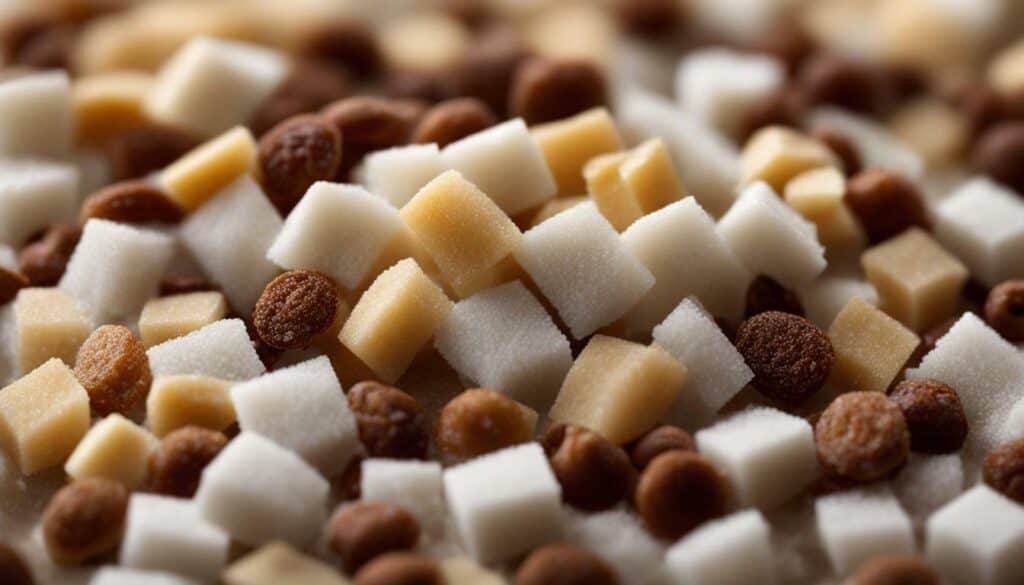
Now that we have unveiled the truth about the carb amount in a single packet of sugar, it’s crucial to be mindful of our sugar intake, especially for those watching their carb consumption. While a small amount of sugar may seem harmless, it can add up quickly throughout the day if we’re not careful. Managing our carbohydrate intake is essential for maintaining a balanced diet and promoting overall health.
The Sugar Packet Nutritional Breakdown
Beyond the carb content, let’s take a closer look at the complete nutritional breakdown of a sugar packet. According to the third source, a packet of sugar contains 15 calories and 4 grams of total carbohydrates, all of which are sugars. The source also mentions that the packet contains 0 grams of fat and protein. This information is based on the serving size of 1 packet (3.5 grams) provided by Domino Sugar.
To gain a better understanding of the nutritional value of a sugar packet, it’s important to examine the table below:
| Nutrient | Amount per Serving |
|---|---|
| Calories | 15 |
| Total Carbohydrates | 4g |
| Sugars | 4g |
| Fat | 0g |
| Protein | 0g |
This breakdown clearly illustrates the primary components of a sugar packet. With all of the carbohydrates in the form of sugars, it is important to be mindful of the potential impact on your overall sugar intake. While sugar can add sweetness to your favorite beverages and recipes, it is essential to consider moderation and explore healthier alternatives when possible.
Next, we will delve into the implications of consuming carbs from sugar packets and the potential effects on your overall health. Stay tuned!
The Impact of Carbs in Sugar Packets
Understanding the impact of carbs in those tiny sugar packets can help us make more informed choices about our sugar intake. While it may seem insignificant, the carbs found in sugar packets can add up, especially if you frequently use them in your hot beverages or recipes. Let’s take a closer look at how these carbs can affect our health and well-being.
Carbohydrates are the body’s primary source of energy, providing fuel for our daily activities. However, consuming too many carbs, especially from sources like refined sugars, can lead to various health issues. When we consume carbs from sugar packets, our bodies quickly convert them into glucose, causing a spike in blood sugar levels. This rapid rise and subsequent fall in blood sugar can leave us feeling fatigued, irritable, and craving more sugar.
Additionally, excessive carb intake can contribute to weight gain and negatively impact our overall health. The body stores excess glucose as fat, leading to unwanted pounds. High carb consumption has also been linked to an increased risk of developing conditions like diabetes and heart disease. Being mindful of the carbs in sugar packets can help us make healthier choices and reduce our risk of these health issues.
| Carb Content in a Packet of Sugar | Calories | Total Carbohydrates (g) | Fat (g) | Protein (g) |
|---|---|---|---|---|
| 1 Packet (3.5g) | 15 | 4 (all sugars) | 0 | 0 |
As shown in the table above, a single packet of sugar typically contains 4 grams of total carbohydrates, all of which are sugars. This carb content may seem small, but it’s essential to be aware of how these carbs can contribute to our daily intake. By making conscious choices and considering alternatives to sugar packets, we can better manage our carb intake and prioritize our health.
Remember, being informed and mindful about the impact of carbs in sugar packets is a step towards creating a healthier lifestyle. It’s all about making small changes and finding balance in our sugar consumption. Stay tuned for the next sections, where we’ll explore alternatives to sugar packets and provide practical tips for managing carb intake.
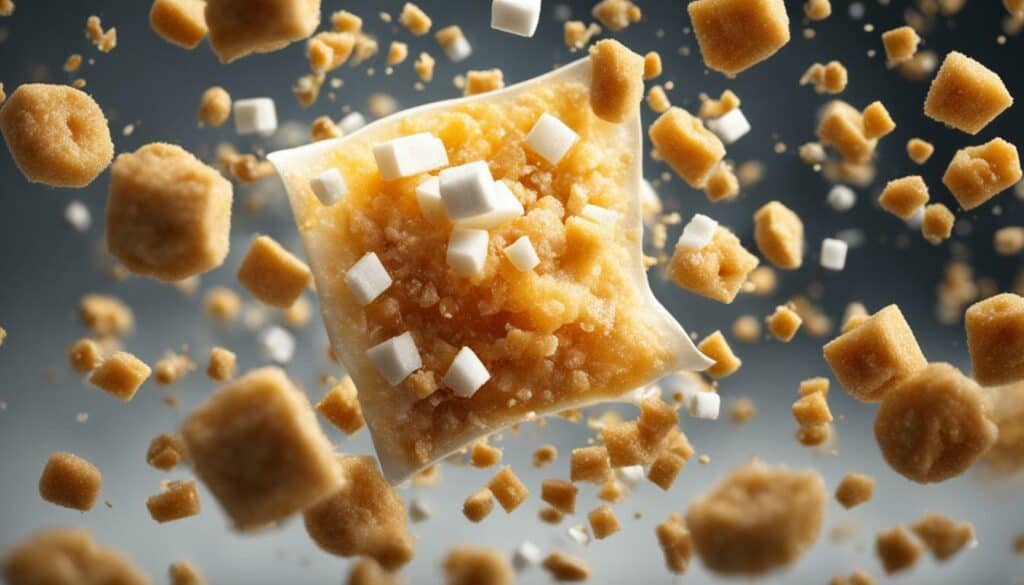
Have you ever wondered how much sugar you’re really adding to your coffee or tea when you tear open a single packet? Well, let’s unveil the truth and decode the serving sizes of sugar packets. According to Domino Sugar, a standard packet of sugar weighs approximately 3.5 grams.
Now, let’s dig into the nutritional facts. Based on the information provided by the third source, a packet of sugar contains 15 calories and 4 grams of total carbohydrates, all of which are sugars. It’s important to note that the packet contains 0 grams of fat and protein. So, when you add that packet of sugar to your beverage, you’re not only adding a touch of sweetness but also 4 grams of carbs.
To give you a better perspective, let’s visualize it with a table:
| Serving Size | Calories | Total Carbohydrates | Sugars | Fat | Protein |
|---|---|---|---|---|---|
| 1 Packet (3.5 grams) | 15 | 4 grams | 4 grams | 0 grams | 0 grams |
So, the next time you reach for a packet of sugar, remember that you’re adding 4 grams of carbs to your drink. If you’re conscious about your carb intake, consider exploring healthier alternatives or reducing the number of sugar packets you use. Managing your carb intake can be an important step towards a healthier lifestyle.
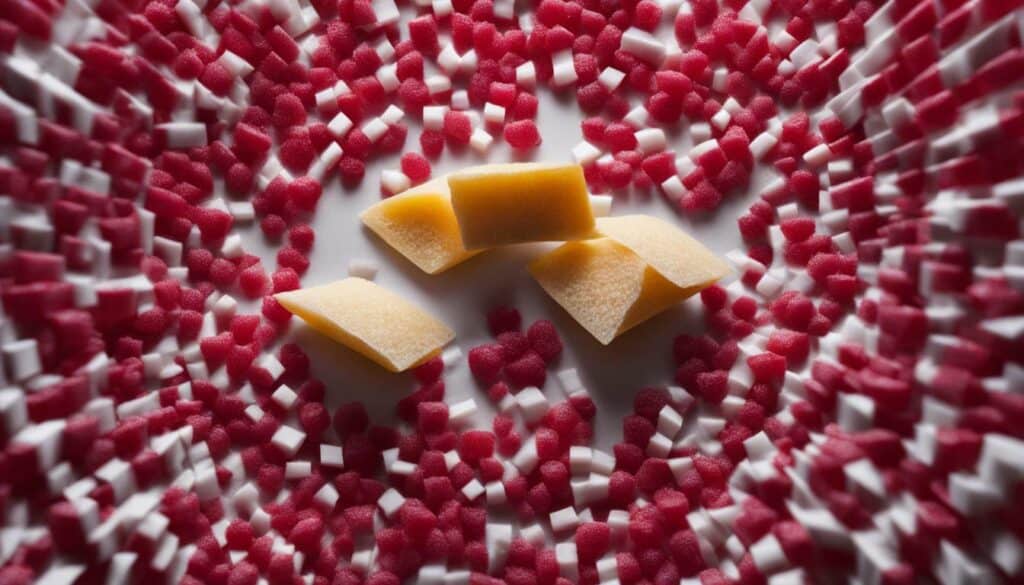
Remember, knowledge is power. Being aware of the carb content in sugar packets can help you make informed choices and take control of your sugar consumption. Keep reading to discover practical tips and alternatives that can further support your journey towards a healthy and balanced lifestyle.
Making Healthier Choices: Alternatives to Sugar Packets
If you’re aiming to cut down on carbs in your diet, there are alternative sweeteners that can replace those sugar packets. These alternatives can provide a similar level of sweetness without the high carb content. Let’s explore some options:
1. Stevia
Stevia is a natural sweetener derived from the leaves of the Stevia rebaudiana plant. It has gained popularity as a low-carb alternative to sugar. Stevia is incredibly sweet, so a small amount can go a long way. It has zero calories and does not raise blood sugar levels, making it suitable for individuals following a low-carb lifestyle. You can find stevia in both liquid and powdered forms, making it easy to incorporate into your favorite beverages and recipes.
2. Monk Fruit Extract
Monk fruit extract is another excellent choice for those looking to reduce their carb intake. Derived from the monk fruit, also known as Luo Han Guo, this sweetener contains natural compounds called mogrosides that provide the sweet taste. Monk fruit extract is virtually calorie-free and does not affect blood sugar levels, making it an ideal option for those following a low-carb or diabetic diet. It is available in both granulated and liquid forms, making it versatile for various culinary uses.
3. Erythritol
Erythritol is a sugar alcohol that occurs naturally in certain fruits and fermented foods. It has a sweetness similar to sugar but contains fewer calories and has a minimal impact on blood sugar levels. Erythritol has the added benefit of being well-tolerated by most people, as it does not commonly cause digestive issues associated with other sugar alcohols. It is available in granulated form and can be used as a 1:1 replacement for sugar in recipes.
| Sweetener | Carbohydrate Content per 100g |
|---|---|
| Stevia | 0g |
| Monk Fruit Extract | 0g |
| Erythritol | 5g |
Remember, when using these alternative sweeteners, it’s important to read the labels and choose those without added fillers or artificial ingredients. Experiment with different options to find the one that best suits your taste preferences and dietary needs.
Exploring alternative sweeteners is a great way to reduce your carb intake while still enjoying the sweetness you crave. Incorporate these options into your daily routine and make healthier choices for a more balanced lifestyle.

Incorporating a few simple strategies can help you stay mindful of your carb intake when using sugar packets. Whether you’re watching your sugar intake for health reasons or trying to maintain a low-carb lifestyle, these tips can make a difference.
1. Read the nutritional information: Before using a sugar packet, take a moment to check the carbohydrate content listed on the packaging. This will give you an idea of how many carbs you’re consuming with each packet. Remember, every gram of carbohydrates counts!
2. Use less sugar: Reduce your carb intake by using less sugar in your beverages or recipes. Gradually decrease the amount of sugar you add to your coffee or tea until you reach a level that still satisfies your taste buds. You may be surprised by how much sweetness you can still enjoy with less sugar!
3. Explore alternative sweeteners: If you’re looking to cut down on carbs even further, consider using alternative sweeteners that have a lower carbohydrate content. Stevia, erythritol, and monk fruit are popular options that can add sweetness without adding a significant number of carbs.
4. Be mindful of portion sizes: It’s easy to pour an excessive amount of sugar into your beverages without realizing it. Use a small spoon or a sugar dispenser with measured holes to control the amount of sugar you’re adding. This can help you manage your carb intake more effectively.
5. Opt for natural sweetness: Instead of relying solely on sugar packets, try incorporating naturally sweet ingredients into your diet. Fresh fruits, cinnamon, and vanilla extract can add a delightful sweetness to your dishes without solely relying on carbohydrates.
Summary
Managing your carb intake from sugar packets is essential for maintaining a balanced diet. By reading nutritional information, using less sugar, exploring alternative sweeteners, being mindful of portion sizes, and opting for natural sweetness, you can take control of your carb intake and make healthier choices.
| Tips for Managing Carb Intake from Sugar Packets |
|---|
| Read the nutritional information |
| Use less sugar |
| Explore alternative sweeteners |
| Be mindful of portion sizes |
| Opt for natural sweetness |
Choosing a Low-Carb Lifestyle: Is It Right for You?
For those looking to take control of their carb consumption, a low-carb lifestyle might be worth considering. By reducing the intake of carbohydrates, particularly from sources such as sugar packets, individuals can potentially achieve various health benefits and improve their overall well-being.
When it comes to embracing a low-carb lifestyle, it’s essential to understand the potential impact on your body. By limiting the amount of carbs consumed, you encourage your body to use fat as a primary source of fuel instead of relying on glucose derived from carbohydrates. This metabolic shift can lead to weight loss, improved blood sugar control, and increased energy levels.
However, it’s important to note that a low-carb lifestyle may not be suitable for everyone. Factors such as individual health conditions, personal preferences, and body composition can influence the effectiveness and sustainability of this dietary approach. Consulting with a healthcare professional or a registered dietitian can provide personalized guidance and help determine if a low-carb lifestyle is the right choice for you.
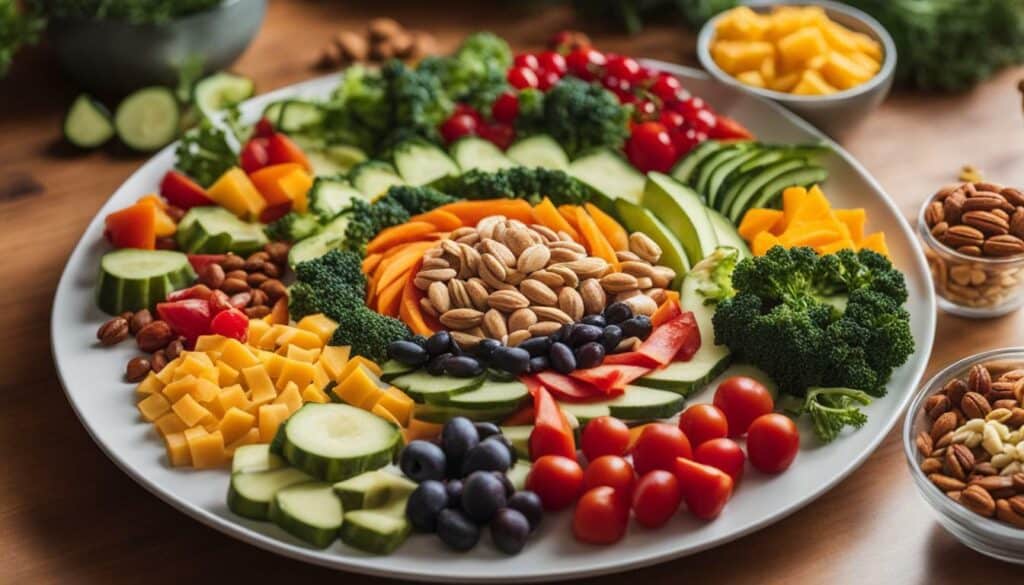
If you decide to embark on a low-carb journey, it’s crucial to have a clear understanding of the types of foods that are low in carbohydrates. Prioritize whole, unprocessed foods such as lean meats, fish, eggs, vegetables, nuts, and seeds. Minimize your intake of processed and sugary foods, including those found in sugar packets.
Sample Low-Carb Meal Plan
| Meal | Food | Carb Content |
|---|---|---|
| Breakfast | Scrambled eggs with spinach and avocado | 5g |
| Lunch | Grilled chicken salad with mixed greens and olive oil dressing | 8g |
| Dinner | Baked salmon with roasted asparagus and cauliflower rice | 10g |
| Snack | Almonds and celery sticks with cream cheese | 4g |
Remember, adopting a low-carb lifestyle is a personal choice that requires commitment and understanding of your body’s needs. Always prioritize a balanced and varied diet, and consult with a healthcare professional before making any drastic changes to your dietary habits.
Conclusion
By understanding the carb content in those tiny sugar packets, we can make informed choices and take control of our sugar intake. When it comes to the number of carbs in a packet of sugar, it’s important to note that a standard packet typically contains 15 calories and 4 grams of total carbohydrates, all of which are sugars.
According to the nutritional information provided by Domino Sugar, this data is based on a serving size of 1 packet, which weighs approximately 3.5 grams. It’s worth mentioning that these numbers may vary slightly depending on the brand or type of sugar used. Nevertheless, having this knowledge empowers us to make smarter decisions about our sugar consumption.
In a world where sugars and carbohydrates are prevalent in many foods and beverages, being conscious of the carb content in sugar packets can make a significant difference in our overall health. By monitoring our intake and opting for healthier alternatives, we can reduce our reliance on sugar packets and make strides towards a healthier lifestyle.
In conclusion, being aware of the carb content in sugar packets allows us to make more informed choices about our sugar intake. By understanding the facts and exploring alternative options, we can take steps towards managing our carb consumption and ultimately improve our overall well-being.
FAQ
Q: How many calories are in a packet of sugar?
A: A packet of sugar contains 15 calories.
Q: How many total carbohydrates are in a packet of sugar?
A: A packet of sugar contains 4 grams of total carbohydrates.
Q: Are all the carbohydrates in a packet of sugar sugars?
A: Yes, all the carbohydrates in a packet of sugar are sugars.
Q: Does a packet of sugar contain any fat or protein?
A: No, a packet of sugar does not contain any fat or protein. It is purely carbohydrates.
Are Mustard Carbs Healthy or High in Sugar?
Are Mustard Carbs Healthy or High in Sugar? Mustard carbs: zesty condiment truth. Mustard is a low-calorie and sugar-free condiment. While it contains carbohydrates, it is typically consumed in such small quantities that its carb content becomes negligible. Enjoy its tangy flavor without worrying about excessive carbs or sugar.

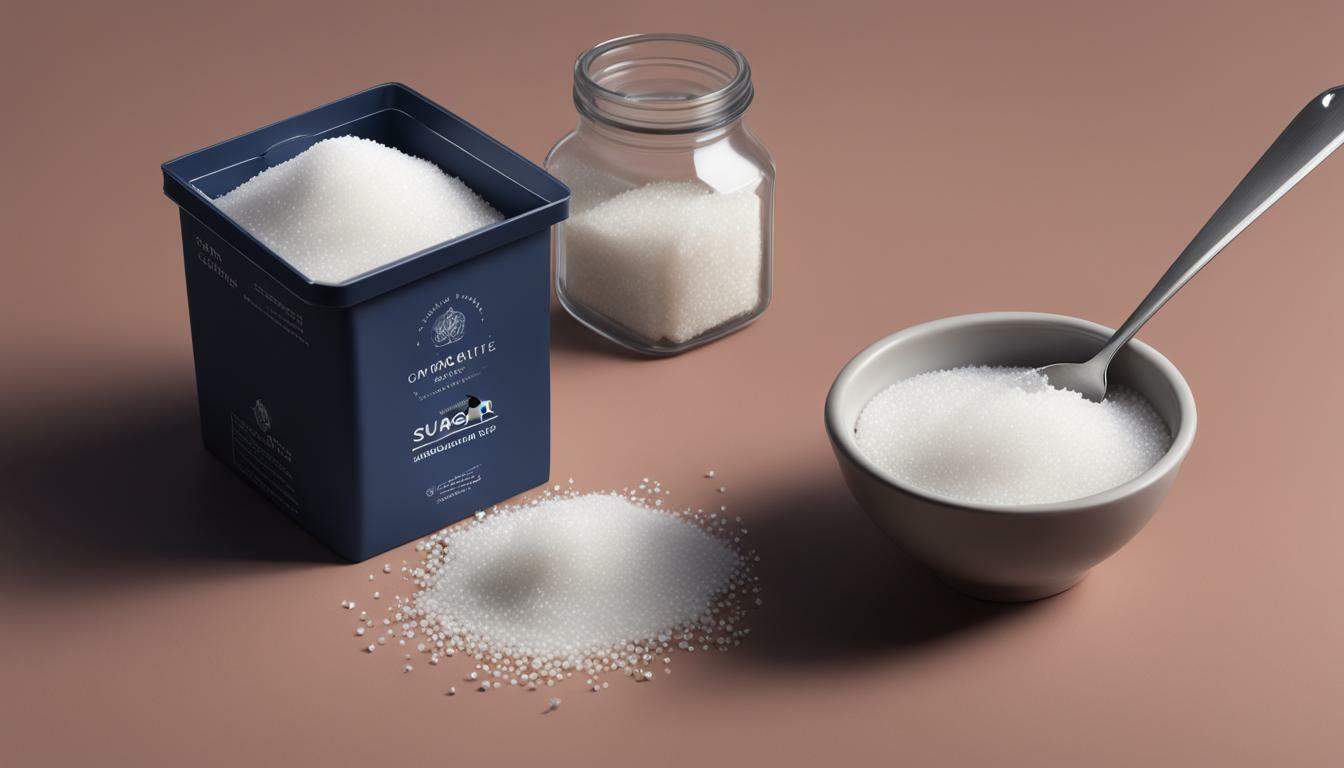



Leave a Reply